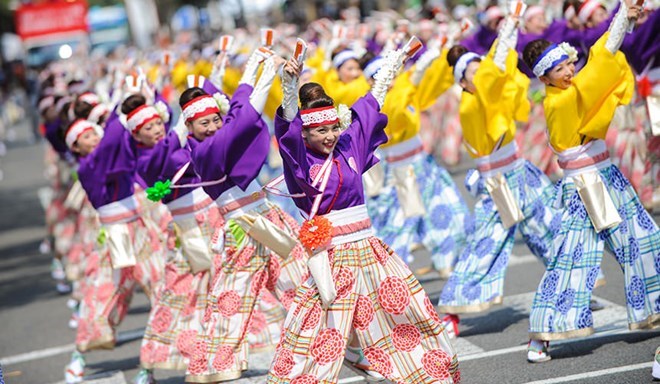



Yosakoi dance performance at Japanese cultural festival in Hanoi (Source: organising board).
Each year, more and more annual cultural exchanges are held in each country, creating a climate for people of both sides to learn about the other culture with more depth and understanding. In Vietnam, Japanese comics have long been a part of childhood memories, with the love of Japanese culture and people going back generations. Over two decades ago, Japanese manga comic books were so appealing that they covered almost all the shelves in every local bookstore. Most millennials today are fans of popular Japanese anime characters like Doreamon, Pokemon, and Maruko, which helped to cultivate qualities such as a hardworking ethic, creativity, and integrity. Many even decided to learn the Japanese language and study there when they grew up.
Nguyen Thuy Huong, 25, said she was familiar with Japanese culture via comics and movies when she was a child. Therefore, she decided to learn Japanese language by applying to the Japanese Faculty at the Hanoi University. At first, she found it quite difficult to grasp because of the unfamiliarity with non-Roman characters. Thanks to the support of Japanese lecturers, she became more hardworking and confident, striving to master a language considered one of the most challenging for learners.
She said she frequently visited the Japanese Foundation Centre for Cultural Exchange (JF) in Hanoi to read Japanese books and improve her language skills. It is here that she made friends with many Japanese nationals and other Vietnamese who shared her ambitions and passion for the foreign culture.
Le Mai Phuong, 28, a graduate of economics at Osaka University, said she hopes to work as a university lecturer teaching economic subjects in Japanese upon returning home, adding that she wants to instil what she knows about the country and people into students as she believes that language and culture will be the most lasting and effective cooperation.
Nguyen Anh Xuan, a Vietnamese student in Japan, speaks about Japanese people with respect and appreciation. He said they generally live low-key lifestyles, but are quite friendly and sociable with foreigners. In particular, they have special sentiments towards Vietnamese people, lauding Vietnamese students as hardworking, smart, and kind.
He said he has learnt from their persevering spirit, strong national unity, and high sense of community.
"The Japanese people have shown the world their bravery in the wake of the past tsunami. They are shining examples of strong will and perseverance to overcome adversity. Such qualities beat the harshness and cruelty of nature. After the disaster passed by, they returned to normal life without any complaints. All the Vietnamese students here adore their resilience”.
"I love this country, I love Japanese people”, Xuan said, adding that he wants to focus on studies to foster further relations between Vietnam and Japan upon his return.
In recent years, it is not only more Vietnamese people living and working in Japan, but also more Japanese people travelling to Vietnam, thus expanding the Japanese-speaking community in the country. While they may come to Vietnam for different purposes, for study or leisure, they have one thing in common: experiencing something interesting in Vietnam and understanding Vietnam better.
Uchida Chikage, a Japanese language collaborator from the JF’s Asia Centre, worked for several secondary and high schools in the central province of Thua Thien-Hue in 2015. Returning to Vietnam in 2016 under the Vietnam-Japan Economic Partnership Agreement, she taught Japanese to Vietnamese nursing staff in Hanoi. During her two years in Vietnam, she said she was inspired by their diligence, politeness, and openness.
She expressed her wish to engage in other activities to serve as a bridge between Vietnamese and Japanese students, hoping that her affinity with Vietnam will help support this dream.
Office worker Kana Yasako has been in Vietnam for nine years and keenly remembers her visits to the JF Centre in Hanoi, where she sparked some friendships with local Vietnamese students. "They help me practise Vietnamese, take me to good restaurants, introduce me to their friends, and show me the local culture and scenery.”
Not only does Kana Yasako want to stay a long time in Vietnam, but she also wants to change the way Japanese people think about the country. "Some Japanese that have never been to Vietnam think that the country is still ravaged by war and backwards. I know it better now, this is my second home.”
According to the JF’s Centre for Cultural Exchange, established in Hanoi in March 2008, the number of Japanese firms in Vietnam and Vietnamese people or students in Japan is rising, proving stronger impacts on politics-diplomacy, economy, academics, and art.
The number of Japanese language learners in Vietnam surged from 44,272 in 2009 to 64,863 in 2015, while the total of those taking Japanese language proficiency tests soared five-fold to 71,242 in 2017 from 13,856 in 2008.
Director of the centre Ando Toshiki said the JF has launched many activities to raise mutual understanding between Japan and various countries worldwide – including in culture-arts, Japanese language teaching, and promoting Japanese studies and intellectual exchanges – thus thus fostering connectivity between Japan and the world.
He said, together with the increase in the number of Japanese language learners, the motivations for their studies have also been increasingly diverse. Therefore, taking teaching approaches suitable to each purpose is a must, and learner-oriented approaches are increasingly important in Vietnam.
"We want to make contributions to human resources development for a global society of peace and prosperity via experiments in Japanese language education”, he said.
"In culture and arts, we also hold film festivals, concerts, dance performances, and support the publication of Japanese literary works in the Vietnamese language, thus introducing diversity of Japanese culture to Vietnam. We appreciate exchanges between Japanese and Vietnamese cultural ambassadors and artists, and more broadly, with those in Asia”.
Source: VNA